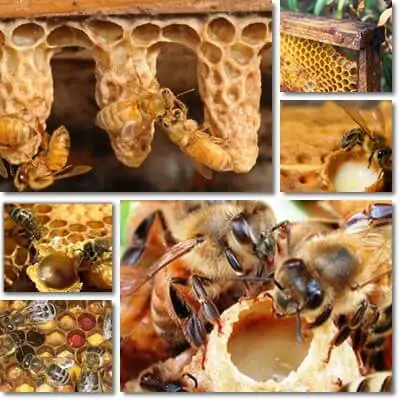Royal jelly is a bee product, secreted by honey bees themselves. It serves as food for newly hatched honey bees during their first few days of life and for the queen bee which feeds exclusively on royal jelly. As a natural supplement, it has been shown to positively impact human health and provide a wide range of health benefits. Different consumers report various benefits and improvements in their health status, from better skin appearance to increased energy levels, improved sleep quality and focus or higher resistance against infectious diseases like the flu.
Royal jelly is a honey bee secretion with nutritional and therapeutic value. The medicinal effects of the bee product are a result of its potent antibacterial, anti-inflammatory and antioxidant properties, antitumor potential, anti-allergic effects and cholesterol-lowering benefits. Eating royal jelly is reported to restore hormonal balance and promote endocrine health, aid fertility and improve conception chances. Research indicates it may have a positive effect on blood sugar levels and help with anemia by supporting red blood cell production.

Overall, eating royal jelly appears to be a healthy practice and many people choose to take the bee product for prolonged periods of time to continue to enjoy its wonderful health benefits. At the same time, research has not been able to quantify and standardize the effects of royal jelly consumption in humans, which has lead to the bee product being considered potentially ineffective overall. Nevertheless, those taking it swear by its amazing benefits. Still, it is important to remember that royal jelly is meant to be consumed in limited amounts and that not everyone can enjoy it.
If you are allergic to honey bees, one or more pollen species, honey varieties or other bee products or if you have asthma or other allergies, it is safe to assume that you have a high probability of being allergic to royal jelly too. Symptoms of an allergic reaction to royal jelly may include skin rash, itchiness and redness, even anaphylaxis, a serious, life-threatening allergic reaction. Symptoms of anaphylaxis onset include a drop in blood pressure, feeling lightheaded or dizzy, swelling of the tongue preventing normal breathing, shortness of breath and ultimately loss of consciousness and death.
Avoiding royal jelly and other bee products as well as foods containing them is recommended. Also, pregnant women, nursing mothers and infants should not consume the bee product because there isn’t sufficient information regarding its safety. Unless you are allergic to honey bees, one or more honey varieties, royal jelly, bee pollen, propolis or other bee products, consumption can be beneficial.

Health benefits
As a result of its particular makeup and unique therapeutic properties, royal jelly boasts the following 11 wonderful uses and health benefits:
1) Benefits the endocrine system. Royal jelly contributes to hormonal balance in both men and women. The bee product has been found to improve hormone levels in both men and women by stimulating the production of testosterone which, in turn, helps synthesize estrogen. This engenders benefits such as those reported by people taking royal jelly supplements: easing and even relieving hot flashes, better-looking skin, clear from acne, improved mood, better concentration and more restful sleep for insomnia sufferers. The effectiveness of royal jelly for skin care is a result of its estrogenic activity.
2) Boosts fertility. Royal jelly boosts fertility in both men and women by stimulating hormone production, potentially increasing pregnancy chances. The effects of royal jelly on estrogen production in particular are local, meaning its action is restricted to the uterus and the ovaries, but the benefits are global. Moreover, despite its poor nutritional value relative to the minimum dietary requirements of an average person, the bee product provides good amounts of nutrients such as zinc and vitamins A, C, E and B vitamins, all of which are required for good fertility.
3) Supports red blood cell production. Royal jelly has been found to support red blood cell production and even increase the lifespan of red blood cells. Red blood cells contain a protein called hemoglobin that contains iron and transports oxygen to muscles, ensuring they have the energy to sustain movement and effort, including more intense physical exercise. Thanks to its action, royal jelly is believed to hold potential benefits for anemia sufferers, helping manage the condition and improve its symptoms, especially fatigue.
4) Boosts energy levels. Although research does not validate such benefits, many people eating royal jelly report feeling a boost in energy levels and no longer experiencing fatigue. The bee product has a certain revitalizing effect, raising energy levels and even supporting more intensive physical effort. This property of royal jelly could be attributed to its effect on red blood cell production, but also to its nutritional content, considering it is a source of essential nutrients such as water-soluble vitamins, fat-soluble vitamins, dietary minerals, enzymes, unique proteins such as royalactin, carbohydrates, antioxidants and other nutrients.
5) Beneficial effects for blood sugar metabolism. A Japanese study analyzing the effects of royal jelly ingestion for six months on healthy volunteers found the bee product may have a positive effect on glucose tolerance. In other words, eating royal jelly could potentially improve our body’s use of glucose, which could prove beneficial for those with prediabetes (hyperglycemia) or type 2 diabetes. Another study revealed the bee product could reduce insulin levels in the blood and potentially improve insulin resistance (Royal jelly ameliorates insulin resistance in fructose-drinking rats).
Insulin is a hormone secreted by the pancreas to help the body use glucose (sugars). In cases of insulin resistance, glucose is not absorbed as it should, so the body increases insulin production in the hopes of ensuring better glucose absorption. This is called insulin resistance because the body is somehow resistant to the effects and roles of the hormone insulin. Foods and other natural products which improve insulin resistance, like royal jelly, have the potential to improve hyperglycemia and help with diabetes. At the same time, it is important to understand that hyperglycemia and diabetes are complex medical conditions whose treatment and management require a multifaceted approach involving dietary changes, lifestyle improvements, medication etc.
6) Cholesterol-lowering properties. Research has revealed that eating royal jelly can reduce total cholesterol levels and LDL (bad) cholesterol levels, contributing to cardiovascular health (Royal jelly supplementation improves lipoprotein metabolism in humans. J Nutr Sci Vitaminol). Another study found the bee product had a beneficial effect on high-density lipoprotein levels, in other words increased HDL (good) cholesterol levels in the blood in older people (Royal jelly increases high density lipoprotein levels but in older patients only. J Altern Complement Med). These effects are attributed to various components, notably sterols (plant compounds similar to cholesterol, which compete with the later for intestinal absorption), antioxidant fatty acids (royalisin, the queen bee acid) and other elements.
7) Antibacterial, antibiotic and antifungal effects. Royal jelly contains unique elements with a strong antibacterial effect. Studies have identified royalisin, a protein with a proven action against Gram positive and Gram negative bacteria, but also antinfungal and anti-mold activity. In addition to this, the bee product contains a compound called 10-hydroxy-2-decenoic-acid, also known as queen bee acid, which exhibits potent antibiotic properties. The antibacterial and antibiotic elements in royal jelly are effective against Escherichia coli, Staphylococcus aureus and several other bacteria.
8) Exhibits antitumor activity. Research on the antitumor activity of royal jelly is conflicting. One the one hand, the bee product has a strong estrogenic activity which leads some researchers to believe it can promote tumor growth. On the other hand, in vitro and animal studies have demonstrated royal jelly can inhibit cancer cell proliferation, prevent the formation of new blood vessels that feed tumors, stopping their growth and induce apoptosis (programmed cell death) in certain types of cancer cells. The bee product has also been shown to increase longevity and even survival rates in mice with tumors.
9) Stimulates the immune system and reduces inflammation. Royal jelly has immunomodulating effects, stimulating the immune system response against infection and disease. Its exhibits pharmacological activity on several elements of the immune system like cytokines and lymphocytes and contributes to various benefits such as reduced inflammation, stronger immune system response, antitumour activity, potential benefits for auto-immune conditions and anti-allergy effects. People taking royal jelly supplements report better overall immunity such as a higher resistance to viral infections such as the flu.
10) Anti-allergy effects. The anti-allergic activity of the bee product is a result of several mechanisms of action. For example, royal jelly inhibits the production of inflammatory cytokines (a type of small protein with roles in the immune system response), inhibiting inflammation and exerting an anti-allergy effect. Moreover, the bee product inhibits the production of immunoglobulin E, a type of antibody that triggers characteristic allergy symptoms and the release of histamine, further contributing to an anti-allergy effect. At the same time, royal jelly is a bee product, meaning it can trigger mild to severe allergic reactions itself, especially in people already allergic to honey bees and their products.
11) Good for brain fog and other neurological benefits. Royal jelly boasts several neurological benefits. For example, consumers report taking fresh royal jelly daily for at least 2-3 months restores focus and improves symptoms of brain fog, increasing productivity. The bee product is reportedly good for apathy and mood swings. Studies show royal jelly has a neuroprotective effect and may improve both spatial memory and cognitive functions, with potential future applications for the treatment of dementia. Lastly, the bee product contains 10-hydroxy-trans-2-decanoic acid, an element believed to offer protection against anxiety and depression.
